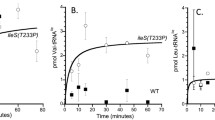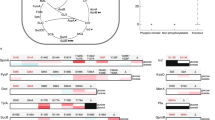Abstract
In addition to methionine, aspartate may also induce sporulation in the Streptomyces fradiae St3110 mutant that requires methionine for sporulation but not for growth. Partially purified aspartokinase (EC 2.7.2.4.) of the mutant was tested for feed-back control by methionine, threonine, and lysine. Methionine or threonine alone did not have any significant effect but they had a concerted inhibitory effect together that was further increased by lysine. The threonine-lysine combination also caused inhibition of the enzyme activity, while lysine alone activated the enzyme. Methionine was also found to partially repress the aspartokinase activity to about one third of the control. The sporulating aerial mycelia induced by aspartate were lacking the characteristic sporulation pigmentation present in the wild type or after induction of spores by methionine. No significant difference in heat resistance between the two types of the spores was detected. The number of spores produced by aspartate was only about one fourth of that after induction by methionine. The data may indicate a role of aspartokinase control by methionine in restoring the normal sporulation, although in addition to this methionine may act by a different mechanism, as well.
Similar content being viewed by others
References
Aharonowitz, Y., Demain, A. L. (1979) Nitrogen nutrition and regulation of cephalosporin production in Streptomyces clavuligerus. Can. J. Microb. 25, 61–67.
Chater, K. F. (1993) Genetics of differentiation in Streptomyces. Annu. Rev. Microbiol. 47, 685–713.
Chater, K. F., Hopwood, D. A. (1993) Streptomyces. In: Sonenshein, A. L., Hoch, J. A., Losick, R. (eds) Bacillus subtilis and Other Gram-positive Bacteria. American Society for Microbiology, Washington, D. C., pp. 83–99.
Coleman, R. H., Ensign, J. C. (1982) Regulation of formation of aerial mycelia and spores of Streptomyces viridochromogenes. 3. Bacteriol. 149, 1102–1111.
Ebner, J. B., Frea, J. I. (1970) Heat resistance during the life cycle of Streptomyces fradiae. Microbios 5, 43–48.
Hänel, F., Friedrich, W., Bormann, E. J., Gräfe, U. (1985) Control of the aspartokinase of Streptomyces noursei and its AEC-resistant mutants. Biotechnol. Lett. 7, 557–562.
Lowry, O. H., Rosebrough, N. J., Farr, A. L., Randall, R. J. (1951) Protein measurement with the Folin reagent. J. Biol. Chem. 193, 265–276.
Mendelowitz, S., Aharonowitz, Y. (1982) Regulation of cephamycin C synthesis, aspartokinase, dihydrodipicolinic acid synthetase and homoserine dehydrogenase by aspartic acid family amino acids in Streptomyces clavuligerus. Antimicrob. Agents Chemother. 21, 74–84
Mendelowitz, S., Aharonowitz, Y. (1983) Beta-lactam antibiotic production by Streptomyces clavuligerus mutants impaired in the regulation of aspartokinase. J. Gen. Microbiol. 129, 2063–2069.
Queener, S. W., Capone, J. J. (1974) Simple method for preparation of homogenous spore suspension useful in industrial strain selection. Appl. Microbiol. 28, 498–500.
Vargha, Gy., Szabó, G. (1984) Nutritional requirements for differentiation in a Streptomyces fradiae mutant. Z. Allg. Mikrobiol. 24, 189–199.
Vargha, Gy., Karsai, T., Szabó, G. (1983) A conditional aerial mycelium-negative mutant of Streptomyces fradiae with deficient ornithine carbamyltransferase activity. J. Gen. Microbiol. 129, 539–542.
Vargha, Gy., Zs.-Nagy, V., Lustyik, Gy., Szabó, G. (1986) Methionine requirement of sporulation in a Streptomyces fradiae mutant. 3. Gen. Microbiol. 132, 2931–2936.
Webley, D. M. (1958) A defined medium for the growth of the thermophilic Actinomycete Micromonospora vulgaris. J. Gen. Microbiol. 19, 402–406.
Author information
Authors and Affiliations
Additional information
Dedicated to the memory of Professor Gábor Szabó.
Rights and permissions
About this article
Cite this article
Vargha, G. a possible role of the effect of methionine on the activity of aspartokinase in sporulation of a Streptomyces fradiae mutant. BIOLOGIA FUTURA 48, 281–288 (1997). https://doi.org/10.1007/BF03543200
Received:
Published:
Issue Date:
DOI: https://doi.org/10.1007/BF03543200




